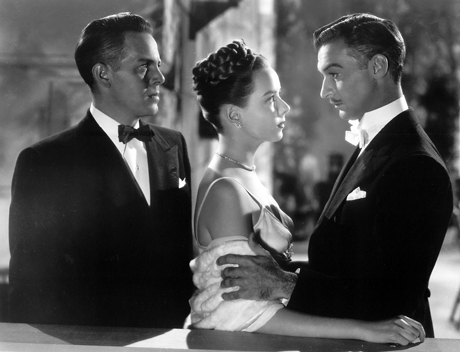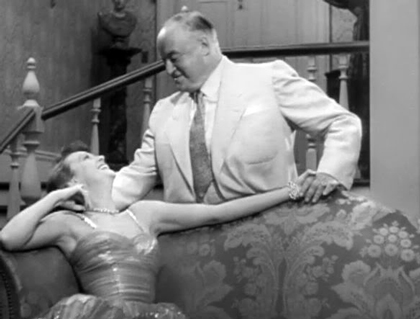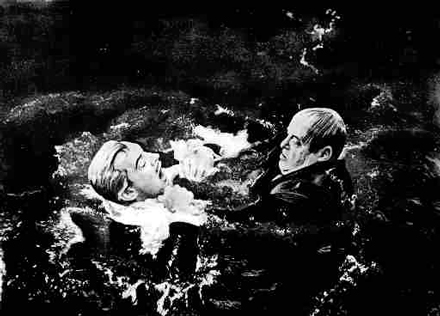
 |
|
|
|
Check out the 1940s filmography of the highly creative Edgar G. Ulmer and you'll find near-unwatchable PRC programmers, quickie musicals and three or four pictures where he overcame budgetary limitations to produce genuine film art. That's not a bad record for any director. The miraculously miniscule Detour and the fairly upscale The Strange Woman have seen reasonable circulation on disc and cable TV, but 1948's Ruthless has been much harder to see. As an Ulmer picture, it stands in a class of its own. Looking at the opening of this relatively lavish show, one wants to run the picture back and check the director credit again -- yep, our good friend Edgar G.'s name is written in impressive lettering across a background of simulated marble. Ulmer may have been trying to make an artistic statement in the stress markings on the marble, which under close scrutiny look like pencil scribblings! But the rest of the picture is indeed lavish. 1 
Beyond being perhaps the only Ulmer picture that for production value can compete with his Universal classic The Black Cat -- I haven't seen all of his European pictures -- Ruthless has a number of highly interesting qualities. It's not really a film noir, although its politics are darker than most noirs. Its primary screenwriter Alvah Bessie was denied billing, presumably for the contempt of Congress citation that made him one of the original Hollywood Ten. Ruthless plays like an anti-capitalist Citizen Kane. Its message is that the unholy competition for money has turned modern society into something soulless and cruel. Financed as a one-shot project by an agent-turned producer, Ruthless plays its quietly subversive theme right out to the bitter end. It has excellent performances by a cast of not-quite big stars, some of them recently relieved of studio contracts. Its main player is the biggest surprise: Zachary Scott gives the performance of his career. A select group of wealthy elites is invited to a massive seaside mansion for an announcement by the fabulously wealthy predatory investor Horace Woodruff Vendig (Zachary Scott of Mildred Pierce). Vendig announces that he's going to give the bulk of his wealth to form a peace organization, to make the world a better place. Although the financial sharpies chalk the whole thing up to a tax dodge, Vendig's oldest friend Vic Lambdin (Louis Hayward of House by the River) isn't so sure. Vic is just one of many dear friends and associates that Vendig has betrayed or abandoned on his climb to riches and power. Vendig wants to mend fences with his childhood pal, but Vic remains suspicious -- especially when his host tries to monopolize Vic's female companion, Mallory Flagg (Diana Lynn of The Miracle of Morgan's Creek). Also present is Buck Mansfield (Sydney Greenstreet), a bitter financier who lost his utilities empire to Vendig's hostile takeover; and Mansfield's ex-wife Christa (Lucille Bremer of Yolanda and The Thief), just one of several women Vendig has used and discarded. Vendig's sudden obsession with Mallory has an almost supernatural quality: she's the exact image of Martha Burnside, who long ago disappeared. Martha was both Vic and Vendig's first love.
The drama uses flashbacks to tell 
Vendig despicable ploys include using a man's wife to fleece him of a near-monopoly on electric power for several states. Unaware of his pal's moral crimes, Vic Lambdin comes in on a big deal, with the promise that their control of utilities will result in lower prices for consumers. Vendig tells his other potential partners that he's making plans for a 15% rate hike. Vendig leaves a wake of ruined people behind him. The movie would have us believe that "the system" encourages such behavior, that H.W. Vendigs are encouraged because the right people keep making money. Everybody else is just a sore loser. As the story points out from the beginning, Woody betrays every trust placed in him. He rewards Old Man Burnside's generosity with outright treachery, breaks hearts and ruins lives. In a fairly subtle bit of writing and directing, it's implied that one of Vendig's lady loves becomes pregnant. He's so insistent on describing his plans, that she doesn't even have a chance to break the news. His motivating principle is plain unvarnished selfish greed, again (in the view of the screenplay) encouraged by "the system". Vendig is only taking the direct path to riches. Like Everett Sloane said in Citizen Kane, it's not all that terribly hard to make a lot of money... if all you want to do is make a lot of money." This movie tells us that making a lot of money requires stepping on people left and right. Not all of Vendig's victims are undeserving. Sydney Greenstreet's fat cat Mansfield is just as nasty, and just as willing to screw over an opponent and have a hearty laugh as he walks away. Vendig can outdo all the Mansfields because he can also inspire good people to help him along his way. For every fair competitor there are five victimized innocents, like the banker whose misplaced trust leads him to commit suicide. Like Citizen Kane, Ruthless unfolds almost as a mystery, shaping up as an interesting drama with strong characters. Zachary Scott's Vendig is a model sociopath, driven to follow his destiny. It's a role of unusual depth -- Scott maintains a game face and only intermittently reveals the monomania beneath. Edgar G. Ulmer proves that he can manipulate a quality cast as well as any director. Diana Lynn glows in the movie, carrying her dual role with ease. She gives Martha's retreat from Vendig a sense of dignified generosity, even as she knows he's ruined her life. Louis Hayward makes us believe that his Vic could believe in Vendig and not be a fool. Interestingly, the "honorable" Vic's big news for his friend is that there are big fortunes to be made in South America. 2 Lucille Bremer and Martha Vickers assay contrasting characters (with period-accurate hairstyles, I should note). Each has an individual allure, and each takes Vendig's maltreatment differently. Making a strong impression as Martha's spirited mother is the dependable Edith Barrett, here looking brighter and happier than usual. 
Ruthless refrains from anti-capitalist position speeches. Its conclusion has now-humorous similarities with Preston Sturges' Sullivan's Travels. Hint: remember the tooth & nail battle of "Capital" and "Labor"? This time, think Wolf versus Wolf. The scheme is a bit different here, providing an action scene for a very unexpected member of the cast. And then there's the famous last line, which underwhelms but gets the point across. Edgar G. has a selection of grandiose sets to work with in Ruthless, including some great neighborhood scenes set somewhere around 1912 or thereabouts. The involved finish at Vendig's seaside villa, with his giant yacht parked offshore, seems sort of a perversion of The Great Gatsby... if everything we found out about Jay Gatsby were the worst of bad news. Ruthless is the Edgar G. Ulmer picture that shows him operating with a decent set of cinematic Tinkertoys, and he does very well indeed. Olive Films' Blu-ray of Ruthless looks incredibly good to this reviewer, especially considering that I watched and waited for more or less thirty years to see it. A bad print on a local TV channel back in 1979 had such poor audio and was riddled with so many splices, that it was unwatchable. A few years back, the director's daughter Arianné Ulmer Cipes presented a 35mm UCLA Archives restoration (funded by The Film Foundation) at the American Cinematheque, and a large audience sat in rapt attention. I wouldn't be surprised if it was the first time for most of them as well. The copy of Ruthless seen here carries a bold Eagle-Lion logo. The only flaw occurs in an early reel, when the screen seems to brighten unaccountably several times. It's as if the power went bad at the lab where the dupe neg was made, way back when ... and it got printed into the new copy. And that's just a guess as well. Olive Films' surprising discoveries in the last two years should really appeal to classic film fans -- almost everything they've been releasing is a semi-lost, semi-abandoned gem.
On a scale of Excellent, Good, Fair, and Poor,
Ruthless Blu-ray rates:
Footnotes:
1. Ruthless begins on a bizarre note, especially coming from one of filmdom's more celebrated designers. Everything else in the movie is more or less realistic, but the opening matte painting establishing Horace Vendig's Xanadu-like mansion fortress appears to be purposely absurd. It looks like a perspective trick by M.C. Escher. On the right side of the screen a car containing Vic and Mallory makes its way up a winding mountain road, which ends at the enormous Vendig estate. But look more closely - the giant house is at sea level, a fact confirmed in the film's final scene. It's a bizarre touch, indeed.
2. Ruthless screenwriter Alvah Bessie apparently didn't think about international effects of predatory finance -- Vic Lambdin has almost certainly made big $$ by exploiting 'profit opportunities' in an undeveloped South American country.
Reviews on the Savant main site have additional credits information and are often updated and annotated with footnotes, reader input and graphics.
Review Staff | About DVD Talk | Newsletter Subscribe | Join DVD Talk Forum |
| ||||||||||||||||||